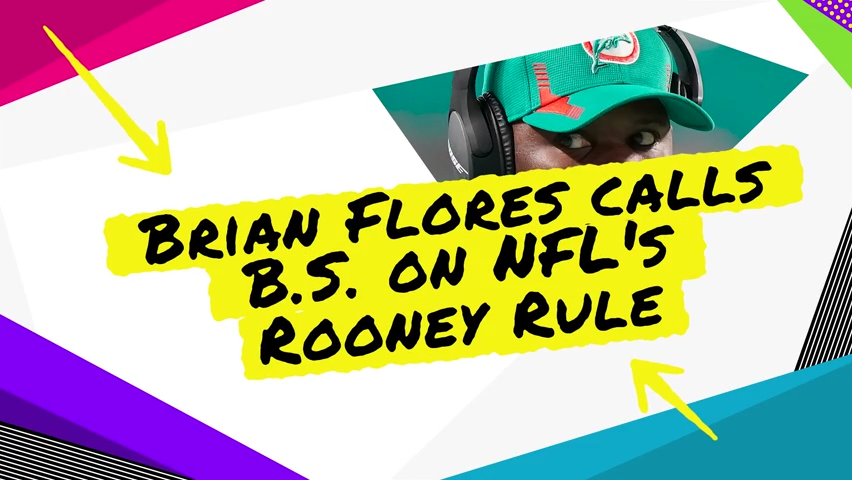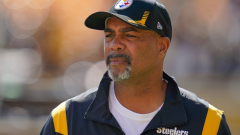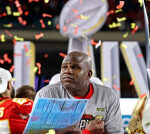The more interviews an NFL coach goes on without being hired, the more questions are raised. The issue makes some minority candidates more discerning about which interviews to take.

During Tony Dungy’s first interview with the Tampa Bay Buccaneers in 1996, he was asked why he thought he had interviewed for so many NFL head coaching jobs and never gotten one.
Dungy, then 40, was exasperated. In the previous decade, he had interviewed just four times. And during two of those interviews, he had been told by team brass that their ideal head coaching candidate had a completely different skillset than his own — offensive expertise, for example, or previous head coaching experience.
“I had four, and two of them for sure I wasn’t going to get, because I wasn’t what they were looking for,” Dungy recalled.
Now an analyst with NBC Sports, he brings up his early interviews not because he holds any ill will toward the teams or executives involved, but because the experience illustrates a frustrating catch-22 that is still present in the NFL coaching world — especially for coaches of color.
“When you interview minority candidates, if you really don’t have an interest in hiring them, then it becomes a stain on (their) resume,” Dungy explained. “You’ve interviewed 10 times and didn’t get selected, so something must be wrong.”
With this year’s NFL coaching carousel now in full swing, USA TODAY Sports set out to examine this issue and others by compiling data on head coaching hires in the two decades since the 2003 implementation of the Rooney Rule, which requires NFL teams to interview minority candidates for top positions. USA TODAY Sports also tracked head-coaching interviews over the same time period, using contemporaneous news reports and team announcements.
The data shows that, from 2003 to 2022, interview opportunities for coaches of color were concentrated among a relatively small group of candidates — familiar faces who were interviewed over and over again for head-coaching roles and, in a majority of cases, not hired.
USA TODAY Sports found that a group of just four Black coaches — Eric Bieniemy, Todd Bowles, Jim Caldwell and Leslie Frazier — accounted for nearly 25% of the publicly-reported interview opportunities given to non-white coaches since the implementation of the Rooney Rule.
Bieniemy, the Kansas City Chiefs’ offensive coordinator, has interviewed for at least 15 jobs and not been hired as a head coach.
“Obviously, the Rooney Rule isn’t working,” said Michael Locksley, the president and founder of the National Coalition of Minority Football Coaches and head coach at the University of Maryland. “It came from a good place, but obviously because of the numbers, it hasn’t created the opportunities that we all thought it would create.
“… You see the same guys being recycled, the same guys interviewing. It’s not that they’re not qualified. Some of them are just being interviewed to basically fulfill a requirement. And we’re not for that.”
NFL representatives have said they are taking numerous steps to foster diverse hiring practices across the organization. Over the past three years, the league has expanded the Rooney Rule to require two minority candidates interview for head-coaching jobs, and broadened it to apply to coordinator and quarterback coach positions.
Thanks at least in part to those efforts, USA TODAY Sports found non-white coaches have received a significantly larger share of interview opportunities in recent years — including about 40% of all head coach interviews from 2019 to 2022.
Those additional interviews, however, have not led to a noticeable uptick in hires. Only six of the 29 vacancies during that four-year period (~21%) went to non-white coaches.
“That was one of the anticipated outcomes that I think we all believed when the Rooney Rule was put in place — that more opportunities to interview would lead to more job hirings of minorities,” said Rod Graves, executive director of the Fritz Pollard Alliance. “And that hasn’t necessarily been the case.”
OPINION: Don’t overthink this, Wilks deserves the Panthers job
IN DEPTH REPORTING: Read more of USA TODAY’s NFL Coaches Project
‘DIDN’T LOOK THE PART’: Reasons why Black coaches don’t get NFL head coaching jobs
‘No rhyme or reason for it’
According to USA TODAY Sports research, no coach has interviewed more frequently over the past two decades than Bowles, the current head coach of the Tampa Bay Buccaneers. The 59-year-old, who is Black, has been up for at least 19 head coaching jobs over eight hiring cycles and been hired twice, most recently last year as the internal successor to Bruce Arians.
Five other Black coaches have interviewed for 10 jobs or more since 2003. Two have yet to be hired: Bieniemy and Pittsburgh Steelers defensive coordinator Teryl Austin (10). Spokespeople for their respective teams declined to make them available for interviews, and their agents did not respond to messages seeking comment.
“You can’t say for sure (if race was a factor),” Austin told The Associated Press in 2021, of why he has yet to be hired. “Maybe I’m not what the owners see when they look in the mirror and they see leadership positions.”
Josh McDaniels (16 interviews) and Adam Gase (12 interviews) have been among the most frequently interviewed white coaches. Each has been hired twice.
Among the other findings in USA TODAY Sports’ data:
► From 2003 to 2022, a total of 57 coaches of color interviewed for at least one NFL head coaching job, compared to 159 white coaches. That’s about three white candidates for every candidate of color.
► The coaches of color in that candidate pool, however, received more interviews on average (4.5 interviews per coach) than their white counterparts (3.2).
► Coaches of color received about 33% of the 769 publicly-reported interviews for head coach positions from 2003 to 2022. They were hired to fill 19.5% of those vacancies.
► Of the nine coaches who have interviewed for the most jobs since 2003 without being hired as a head coach, seven of them are Black. (Darrell Bevell and Russ Grimm are the others.)
USA TODAY Sports’ data does not include clandestine interviews, nor reflect multiple interviews conducted with the same team during the same coaching search — i.e., second-round and finalist interviews.
It also excludes three hires made as part of internal succession plans, and a fourth — the Chiefs’ hiring of Todd Haley in 2009 — for which no public information is available.
“Watching this thing unfold for 35 years, it’s better — the league is much better. But the hiring process is always a mystery,” former NFL coach and ESPN analyst Herm Edwards said.
“It’s not anybody’s fault. I’m not blaming any coach who got hire





